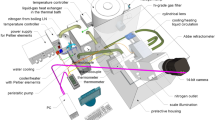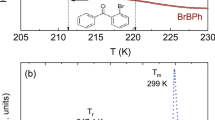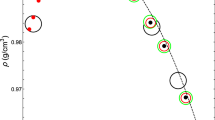Abstract
IT is well known1 that pure alcohols exhibit a large dielectric absorption at radio frequencies, together with a very much smaller absorption in the centimetre region. For measurements at a fixed wave-length of 10 cm., this corresponds to the occurrence of loss peaks at temperatures of the order of + 100° C. and – 100° C. respectively. In practice, the low-temperature loss peak thus found would be largely obscured by the loss at high temperatures; but this is no longer the case when the alcohol is dissolved in a non-polar solvent.
This is a preview of subscription content, access via your institution
Access options
Subscribe to this journal
Receive 51 print issues and online access
$199.00 per year
only $3.90 per issue
Buy this article
- Purchase on Springer Link
- Instant access to full article PDF
Prices may be subject to local taxes which are calculated during checkout
Similar content being viewed by others
References
For example, Luthi, Helv. Phys. Acta, 6, 139 (1933). Girard and Abadie, Trans. Farad. Soc., 42A, 40 (1946). Häfelin, Arch. Sci. Phys. et Nat., 28, 19 (1946).
Author information
Authors and Affiliations
Rights and permissions
About this article
Cite this article
PHILLIPS, C. Dielectric Relaxation of Alcohol–Heptane Mixtures. Nature 166, 866–867 (1950). https://doi.org/10.1038/166866b0
Issue Date:
DOI: https://doi.org/10.1038/166866b0
Comments
By submitting a comment you agree to abide by our Terms and Community Guidelines. If you find something abusive or that does not comply with our terms or guidelines please flag it as inappropriate.



